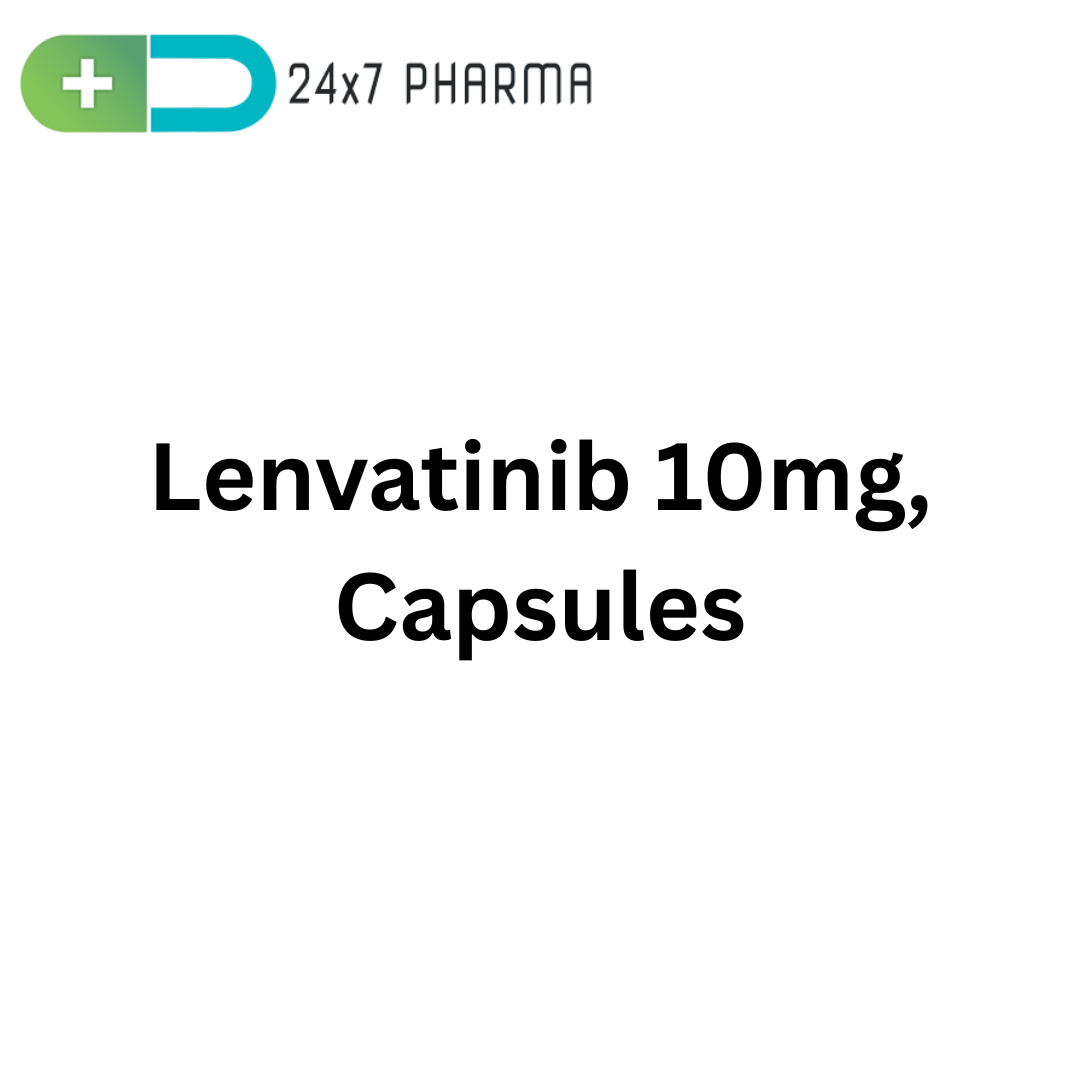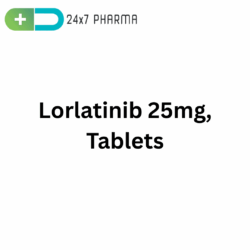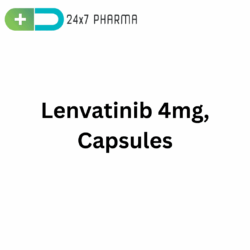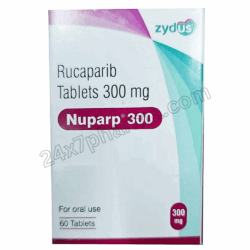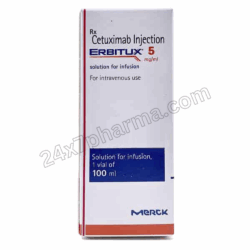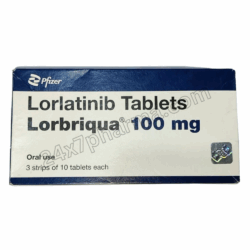LuciLenva 10mg, Lenvatinib Capsules
LuciLenva 10mg is a targeted cancer therapy containing Lenvatinib, a powerful multi-kinase inhibitor. It is used primarily in the treatment of specific types of cancers such as thyroid cancer, renal cell carcinoma (kidney cancer), and hepatocellular carcinoma (liver cancer). Manufactured and distributed under various trade names, including LuciLenva, Lenvatinib has become a valuable tool in oncology for improving survival and disease control in patients with advanced malignancies.
What is LuciLenva 10mg?
LuciLenva 10mg is an oral capsule formulation of Lenvatinib mesylate, a synthetic compound used as a cancer-fighting agent. It is a member of the tyrosine kinase inhibitor (TKI) medication class. These agents are designed to block specific proteins (kinases) involved in the growth and proliferation of cancer cells and tumor blood vessels.
It is prescribed mainly for:
- Differentiated thyroid cancer (DTC) unresponsive to radioactive iodine therapy
- Pembrolizumab combined with advanced renal cell carcinoma (RCC)
- Hepatocellular carcinoma (HCC) in patients not eligible for surgical intervention
- Endometrial carcinoma in combination therapy
How It Works / Mechanism of Action
Lenvatinib works by inhibiting multiple receptor tyrosine kinases (RTKs), which are enzymes that play a critical role in signaling pathways controlling tumor growth, angiogenesis (formation of new blood vessels), and cancer cell survival.
Key targets include:
- VEGFR 1–3 (Vascular Endothelial Growth Factor Receptors): Vital for new blood vessel formation in tumors
- FGFR 1–4 (Fibroblast Growth Factor Receptors): Important in cancer proliferation and survival
- PDGFRα (Platelet-Derived Growth Factor Receptor Alpha)
- RET and KIT proto-oncogenes
- By blocking these pathways, LuciLenva reduces tumor blood supply, restricts cancer cell growth, and may lead to cancer cell death.
How to Use / Indications
LuciLenva is indicated in the following conditions:
Radioiodine-Refractory Differentiated Thyroid Cancer (RAI-R DTC):
- Used as monotherapy when tumors do not respond to radioactive iodine therapy.
Advanced Renal Cell Carcinoma (RCC):
- ln conjunction with pembrolizumab in patients who are not suitable candidates for radiation therapy or curative surgery.
Unresectable Hepatocellular Carcinoma (HCC):
- As a first-line treatment for patients who are not surgical candidates.
Advanced Endometrial Carcinoma:
- ln conjunction with pembrolizumab in patients who are not suitable candidates for radiation therapy or curative surgery.
How to Take / Dosage
Dosage of LuciLenva 10mg depends on cancer type and individual patient factors:
DTC:
- Usual adult dose is 24 mg orally once daily (in divided strengths like 10 mg and 4 mg tablets).
RCC (with everolimus):
- Take 5 mg of everolimus and 18 mg of lentivinib orally once a day.
For RCC (with pembrolizumab):
- Lenvatinib 20 mg once daily, followed with 200 mg of pembrolizumab intravenously every three weeks.
HCC:
- Weight ≥60 kg: 12 mg once daily
- Weight <60 kg: 8 mg once daily
Endometrial Cancer (with pembrolizumab):
- Lenvatinib 20 mg once daily
Administration Tips:
- Take at the same time daily with or without food.
- Swallow capsule whole with water.
- Do not crush, chew, or open the capsule.
- Other Dosage Forms & Strengths
Lenvatinib is available in several dosage strengths to allow flexibility in dosing:
- 4 mg capsule
- 10 mg capsule
Doctors may adjust the dose based on:
- Tolerability
- Side effects
- Liver/kidney function
- Drug interactions
Side Effects
Common side effects
- Fatigue
- High blood pressure (hypertension)
- Diarrhea
- Decreased appetite
- Nausea and vomiting
- Weight loss
- Stomatitis (mouth sores)
- Hand-foot syndrome
- Proteinuria (protein in urine)
- Elevated liver enzymes
Serious adverse reactions:
- Cardiac dysfunction
- Hemorrhage
- Gastrointestinal perforation
- Thromboembolic events (blood clots)
- Renal failure
- QT interval prolongation (heart rhythm disorder)
- Patients should undergo regular monitoring for blood pressure, kidney function, liver function, and ECGs as needed.
Storage
- Store below 30°C (86°F)
- Protect from moisture and light
- Keep in the original packaging until use
- Keep out of reach of children
Benefits
- Targeted Therapy: Directly interferes with cancer cell pathways
- Improves Progression-Free Survival: Especially in thyroid, kidney, and liver cancer
- Oral Administration: Convenient and non-invasive
- Multi-targeted: Attacks tumor and blood supply simultaneously
- Combination Therapy: Enhances efficacy with agents like pembrolizumab
Prescription
LuciLenva is a prescription-only medication and must be administered under the guidance of an oncologist. Dosage modifications and supportive care may be necessary based on patient response and side effects.
Interaction
Lenvatinib has potential interactions with:
- CYP3A4 inhibitors/inducers (e.g., ketoconazole, rifampicin)
- Antihypertensive medications (risk of hypotension)
- Anticoagulants or antiplatelet drugs (increased bleeding risk)
- QT-prolonging drugs (risk of cardiac arrhythmia)
Always inform your doctor of all medications, herbal supplements, and over-the-counter products being used.
FAQs
Can I take LuciLenva with food?
Yes, it can be taken with or without food.
Is LuciLenva a chemotherapy drug?
No, it’s a targeted therapy, not traditional chemotherapy.
How long should I take LuciLenva?
As long as it’s effective and tolerated—your doctor will decide.
Conclusion
LuciLenva 10mg (Lenvatinib) is a groundbreaking targeted therapy that plays a vital role in the treatment of advanced thyroid, kidney, liver, and endometrial cancers. With its ability to block multiple kinases involved in tumor growth and angiogenesis, it has significantly improved patient outcomes across various cancer types. However, like all potent therapies, it must be used under close medical supervision due to its risk of side effects and drug interactions. Through individualized treatment plans and careful monitoring, LuciLenva helps bring hope and extended survival to cancer patients who previously had limited options.

